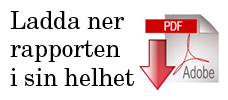Many Swedish football supporters are of the opinion that they are treated unfairly by journalists – that the press with few exceptions tend to write about them in occasions of violence and other problems related to hooliganism. This view was confirmed by an investigation into sports related violence, ordered by the Swedish government, describing the media coverage as unbalanced.
The purpose of our study was to check if there was any truth in those statements. We carried out a quantitative content analysis on eight major Swedish newspapers using a digital archive and a search string specifically designed to find articles about football fans. We only wanted to look into the current state of the issue, but still decided on analyzing articles from both 2011 and 2012, since the 2011 football season was characterized by several supporter related incidents and that 2012 in comparison was a very calm year.
In total we analyzed more than 700 articles and found that the majority of these are putting supporters in a negative context. An article was almost three times as likely to be negative than positive. It should be noted that there was a difference in that ratio between the two different seasons, as the coverage of the 2012 season was more balanced. The results also show that supporters often are bundled together, making the collective responsible for acts committed by a few individuals.
Another significant find was that supporters very rarely are heard in the news. Most of the time their voices are left out – even in articles covering important policy decisions regarding supporters.
Our conclusions are that it is true that supporters generally are portrayed in a negative manner and that the reporting doesn’t give a fair picture of the average football fan. You could argue that this is a problem, but the criteria of news values and growing importance of a sharp angle makes for a journalism that doesn’t perfectly mirror society. In other words: this is not a problem specific for the coverage football supporters.
Still there are some ethical doubts about the reporting. For instance, Swedish press ethics constitutes that both sides of a conflict should be heard. This is not the case when supporter issues are on the table. It is also problematic that perpetrators of violent acts aren’t singled out as individuals rather than implying that all supporters somehow are involved.
As much as we think that journalists are generally responsible for the unbalanced reporting, we also believe that it is imperative for supporters and their representatives to adapt to the logic of media. They must act in order to be heard and to be able to change the way football fans are portrayed.


